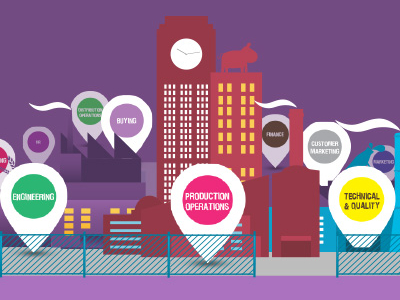What’s it all about then?
As a Maintenance Engineer you’ll take ownership of a particular part of your site’s equipment to ensure its continued and uninterrupted performance, and extend its life in service. You’ll intelligently prioritise maintenance, and schedule the work to minimise disruption – completing necessary engineering maintenance, servicing and calibration work quickly and efficiently – but most importantly, safely.
What might I be doing?
No two days as a Maintenance Engineer are the same, as you carry out a varied mix of planned and reactionary work. Most of your time will be spent doing everything you can to ensure things don’t go wrong, but when they do you’ll need to quickly get to the root of the problem, solve it and work to ensure it doesn’t happen again – all to maximise production and minimise stoppages.
What will be expected of me?
Everyone will look to you to make constant improvements in equipment maintenance and usage – within the specific areas you are responsible. You’ll carry out complete monitoring to an agreed schedule to ensure the efficiency and safety of electrical other equipment. All the time, ensuring you strictly follow all food safety standards.
What can I expect?
The role of Maintenance Engineer will be exciting and challenging, with an ever-growing range of technology to contend with. There’s always a new piece of state of the art equipment to understand, and breakthroughs in automation are demanding the highest calibre of engineers across the entire industry.
Your biggest challenge will be understand the vast number of different pieces of equipment on site, understanding and managing ‘replace’ or ‘mend’ decisions, and working under a time pressure to maintain production schedules.
What qualifications do I need to get in?
At least a four year apprenticeship and related qualification in engineering electrical and/or mechanical engineering. The EDEN Engineering Apprenticeship is one of the best starting points for this role.
What about further training?
You’ll continue training to achieve highest level of site and plant skills, as well as progressing core skills as required – and you’ll assist in the development of other engineers, apprentices and production staff.
Plus there’s plenty of opportunity for even more training, as new equipment comes in and regulations change. There are also lots of areas you can specialise in, such as automation, site services and project management. Or you may want to consider your HNC in Engineering or a qualification in management and leadership.
Anything else I might need to know?
This is a rewarding job if you like practical problem solving work and don’t mind getting your hands dirty.
There are loads of opportunities to progress your career and maintenance staff will be in continual demand in food companies for the foreseeable future.
 cy
cy





